Search the Special Collections and Archives Portal
Search Results
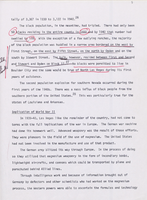
Essay, A Demographic Impact of Basic Magnesium on Southern Nevada, by Roosevelt Fitzgerald, May 12, 1982
Date
Description
Essay by Roosevelt Fitzgerald focusing on demographic changes in southern Nevada from 1940-1945 and the war industry's effect on black employment, particularly the impact of Basic Magnesium, dated 1982.
Text

Transcript of interview with Jimmy Gay by Perry Kaufman, April 12, 1972
Date
Archival Collection
Description
Interview with James A. Gay III conducted by Perry Kaufman on April 12, 1972. Arriving in 1946 from Fordyce, Arkansas, Gay became the first African-American mortician in Las Vegas. He later worked as Assistant Manager of the Sands Hotel and Casino and Union Plaza while serving as an executive board member of the Culinary Union. Instrumental in the Las Vegas community, Gay worked to improved race relations, addressing social, economic, and civic issues. Gay was awarded an honorary degree from the University of Nevada, Las Vegas in 1988.
Text
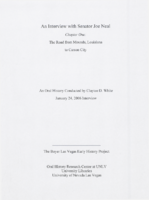
Transcript of first interview with Senator Joe Neal by Claytee D. White, January 24, 2006
Date
Archival Collection
Description
First interview in a series of five with Nevada State Senator Joe Neal conducted by Claytee D. White on January 24, 2006. Born in Mounds, Louisiana, in 1935, Neal joined his family in Las Vegas as a young man shortly before serving in the United States Air Force from 1954 to 1958. Following his military service, he earned a bachelor's degree in political science at Southern University in Baton Rouge, Louisiana. Neal continued his education at the Institute of Applied Science in Chicago, Illinois, with postgraduate work in law. From 1973 to 2001, he served in the Nevada Legislature as the Senator from Clark County Senatorial District No. 4. In the first interview, Neal recalls his childhood, moving to Las Vegas as a teenager, and joining the Air Force. He discusses his early experiences in politics and his involvement in various issues.
Text
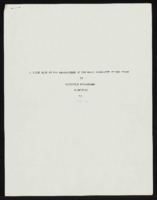
"A Brief Look of the Development of the Black Community of Las Vegas": manuscript draft by Roosevelt Fitzgerald
Date
Archival Collection
Description
From the Roosevelt Fitzgerald Professional Papers (MS-01082) -- Unpublished manuscripts file.
Text
Video interview with Rose Hamilton, Carolyn Haywood, Marilyn Armstrong, Hannah Johnson, Bobbie Gilmore and Delores "Dodi" Johnson, January 20, 2007
Date
Archival Collection
Description
Oral history conversation with Rose Hamilton, Carolyn Haywood, Marilyn Armstrong, Hannah Johnson, Bobbie Gilmore and Delores (Dodi) Johnson. The group shares memories of how they and their families came to live in Las Vegas during the late 1940s and early 1950s.
Moving Image

James A. Gay III interview, 1973: transcript
Date
Archival Collection
Description
Interview with James A. Gay III conducted by Joyce M. Wright in 1973. Edited by Elizabeth Nelson Patrick, and transcribed for the project "Black Experience in Southern Nevada, Donated Tapes Collection," James R. Dickinson Library, University of Nevada, Las Vegas, December 1978. Arriving in 1946 from Fordyce, Arkansas, Gay became the first African-American mortician in Las Vegas. He later worked as Assistant Manager of the Sands Hotel and Casino and Union Plaza while serving as an executive board member of the Culinary Union. Instrumental in the Las Vegas community, Gay worked to improved race relations, addressing social, economic, and civic issues. Gay was awarded an honorary degree from the University of Nevada, Las Vegas in 1988.
Text
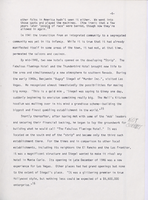
Black Entertainers in Las Vegas: 1940 - 1960
Date
Description
Essay by Roosevelt Fitzgerald reflecting on black entertainers during the early days of the Las Vegas Strip, dated 1988.
Text
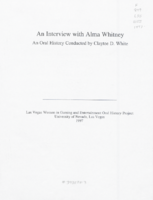
Transcript of interview with Alma Whitney by Claytee D. White, March 3, 1996
Date
Archival Collection
Description
Interview with Alma Whitney conducted by Claytee D. White on March 3, 1996. Seeking better employment opportunities, Whitney moved to Las Vegas from Tallulah, Louisiana, at the age of sixteen. Whitney supported Westside churches and schools and was respected as supervisor in housekeeping at Desert Inn. Whitney provides information on the African American migration to Las Vegas during the 1940s, post-war race relations in Las Vegas, the daily work of hotel maids, and the Culinary Union.
Text
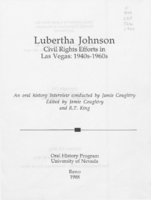
Edited narrative of interview with Lubertha Johnson by Jamie Coughtry, 1988
Date
Description
Edited narrative of an interview with Lubertha Johnson by Jamie Coughtry, dated 1988. Recalling her youth in Mississippi and move to Las Vegas, Johnson discusses civil rights, discrimination, and other topics between 1940 and 1970.
Text
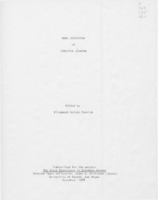
Transcript of interview with Lubertha Johnson by Larry V. Buckner, February 10, 1978
Date
Archival Collection
Description
Interview with Lubertha Johnson conducted by Larry V. Buckner on February 10, 1978. Johnson moved to Las Vegas in the late 1940s from Mississippi and worked as a recreation director, nurse, and director of an anti-poverty progam, serving as a civic leader.
Text
